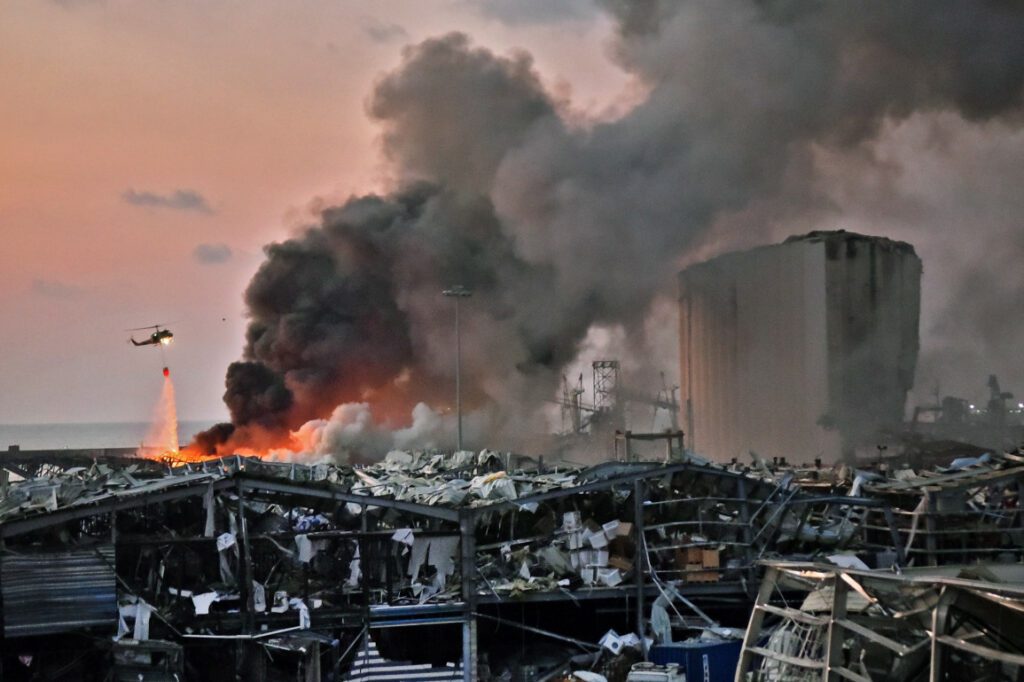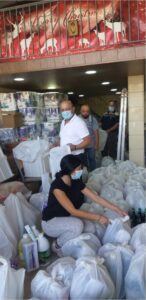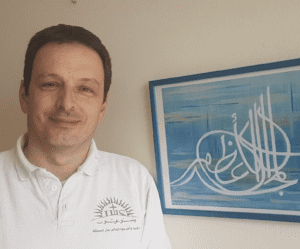Par Clara Atallah

Is there a way to accompany these people who are suffering so much? Is there a way to bring a ray of hope to a devastated people? Fr. Gabriel Khairallah, SJ, a teacher at Saint Joseph University (USJ) in Beirut and at Sciences Po Paris, as well as director of the Cercle de la Jeunesse Catholique (CJC) in Lebanon, shares his experience.
The explosion caused the destruction of countless homes and the displacement of more than 300,000 families. Given this disastrous situation, something had to be done. The first thing the Society of Jesus did was provide funds to distribute emergency meals. “When we saw the total absence of the state in the management of the crisis, we decided to support the young volunteers of the association Offre Joie by giving them emergency meals to distribute, as they were rebuilding their city with their own hands. They did this for about three months,” Fr. Khairallah explained.
In addition, Fr. Khairallah responded to the request of the parish priest of Mar Mikhael (a region that borders the port) to visit families in the Karantina neighbourhood, which had been greatly affected by the explosion. For a whole year, this group of religious men and women faithfully visited these vulnerable households, regardless of religion. “My work was mainly accompanying people and listening. People needed to talk, especially the elderly persons who had not left their homes. They looked forward to the visits and to receiving communion, and they worried whenever I was away.”
“My work was mainly accompanying people and listening. People needed to talk.”

“The people were completely overwhelmed and exhausted. They needed a sign of hope.”
As often as possible, Fr. Khairallah and the others tried to respond to this need for hope and consolation. “In the first months after the explosion, we went every day to visit the families. After a while, though, I started to experience mental exhaustion. I have a psychiatrist friend who recommended that I spread out my visits and spend weekends in the country to rest and replenish my energy. And that’s when I realized how fortunate and privileged I was to be able to leave from time to time and go to the Jesuit residence outside of Beirut (or even to travel to France to teach!), unlike the inhabitants of the Karantina neighbourhood who had the port and the destroyed silos in front of them every day.” Beirut was unlivable at that time; death was everywhere.
“But despite the fatigue, we couldn’t allow ourselves to stop! The energy of the volunteers from Offre Joie, who even came from abroad to support us, gave us a lot of strength. So, if I went to the countryside every once in a while to renew my energy, it was with the aim of continuing this mission of accompaniment!”
Now the Jesuits continue to support the impoverished population through food aid, the daily distribution of hot meals, and medical assistance through their dispensary.
Fr. Khairallah praises the enthusiasm of the CJC volunteers

In Zahle (in the mountainous and poor region of the Bekaa), 220 meals are distributed per day, four times a week, 150 food packages per month, as well as diapers and milk for children. Fr. Khairallah personally goes to Zahle once a week to distribute the boxes and to visit the families with the volunteers.
The beneficiaries are identified through a network of parishes and local organizations, assisted by social workers who assess the individual situations. The households consist mainly of single elderly people or families that include persons with severe disabilities.
The Jesuits are committed to supporting the population as long as they have the means to do so. “The challenge now is to be able to sustain this work over time. With the war in Ukraine and the recent devastating earthquake in Syria and Turkey, we are uncertain about the sustainability of our activities”, says Fr. Khairallah.

Issam, a volunteer at the CJC, speaks of having witnessed situations of extreme poverty. But he has also been deeply touched by the way that those who are poor share their goods with others, despite their difficult situation. “When an elderly woman in need is given a ration of food, she is quick to share it with her neighbor who does not have enough to eat.” Issam’s commitment not only has taught him to focus on the essentials and thank the Lord for all his graces, but also gives him the strength he needs in everyday life.

